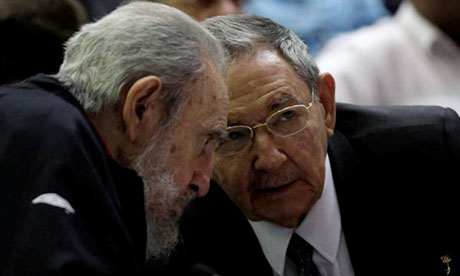Raúl Castro to step down as president in 2018
Cuban leader announces in a broadcast to the nation he will leave office after his second term in power ends in five years Fidel Castro, left, made a rare public appearance by his brother Raúl's side as Cuba's new National Assembly met in Havana. Photograph: Ismael Francisco/AFP/Getty Images
Fidel Castro, left, made a rare public appearance by his brother Raúl's side as Cuba's new National Assembly met in Havana. Photograph: Ismael Francisco/AFP/Getty Images
Cuban leader Raúl Castro announced on Sunday he would step down from power after his second term as president ends in 2018.
Castro made the announcement in a nationally broadcast speech shortly after the Cuban National Assembly elected him to a second five-year term in the opening session of the new parliament.
In a surprise move, the new parliament named a rising young star as his first vice president, Miguel Diaz-Canel, 52, a member of the political bureau who rose through the party ranks in the provinces to become the most visible possible successor to Castro. Diaz-Canel would succeed Castro if he cannot serve his full term.
Castro says the country has reached a "transcendent" moment in which it is ready to start transferring responsibility and power to a younger generation.
Diaz-Canel's appointments marks the first time someone who did not directly participate in the 1959 Cuban revolution assumed such an important role.
Raul Castro, 81, who officially replaced his ailing brother as president in 2008, has repeatedly called for senior leaders to hold office for no more than two five-year terms.
He starts his second term immediately. In 2018, Castro will be 86
Cuban leader announces in a broadcast to the nation he will leave office after his second term in power ends in five years
- Reuters in Havana
- guardian.co.uk, Sunday 24 February 2013 18.41 EST
 Fidel Castro, left, made a rare public appearance by his brother Raúl's side as Cuba's new National Assembly met in Havana. Photograph: Ismael Francisco/AFP/Getty Images
Fidel Castro, left, made a rare public appearance by his brother Raúl's side as Cuba's new National Assembly met in Havana. Photograph: Ismael Francisco/AFP/Getty ImagesCuban leader Raúl Castro announced on Sunday he would step down from power after his second term as president ends in 2018.
Castro made the announcement in a nationally broadcast speech shortly after the Cuban National Assembly elected him to a second five-year term in the opening session of the new parliament.
In a surprise move, the new parliament named a rising young star as his first vice president, Miguel Diaz-Canel, 52, a member of the political bureau who rose through the party ranks in the provinces to become the most visible possible successor to Castro. Diaz-Canel would succeed Castro if he cannot serve his full term.
Castro says the country has reached a "transcendent" moment in which it is ready to start transferring responsibility and power to a younger generation.
Diaz-Canel's appointments marks the first time someone who did not directly participate in the 1959 Cuban revolution assumed such an important role.
Raul Castro, 81, who officially replaced his ailing brother as president in 2008, has repeatedly called for senior leaders to hold office for no more than two five-year terms.
He starts his second term immediately. In 2018, Castro will be 86


Comment